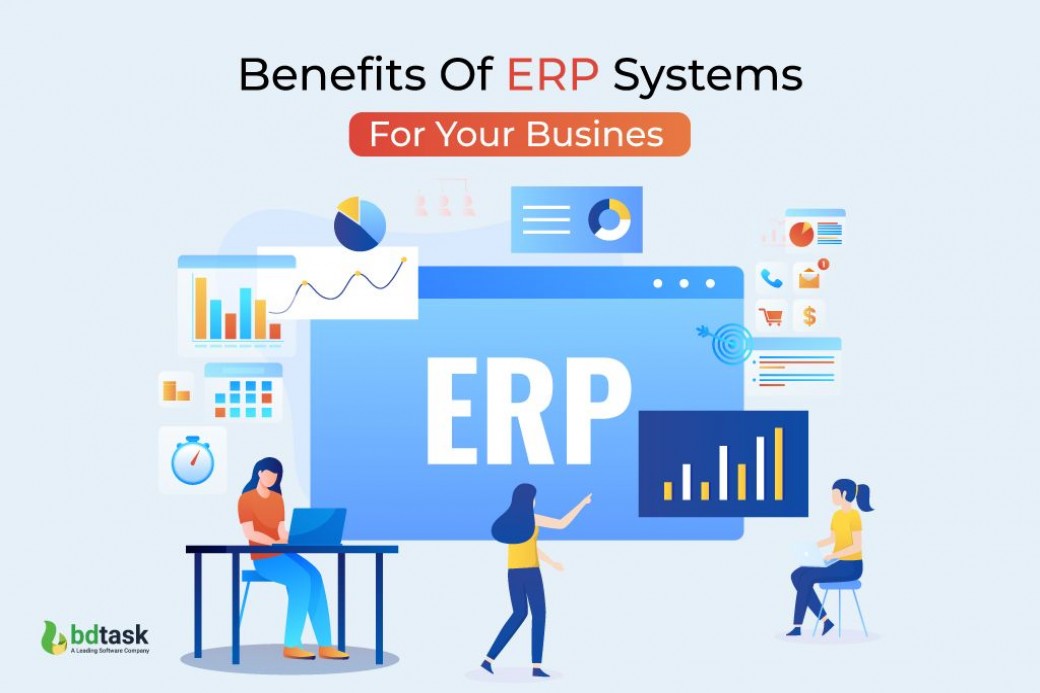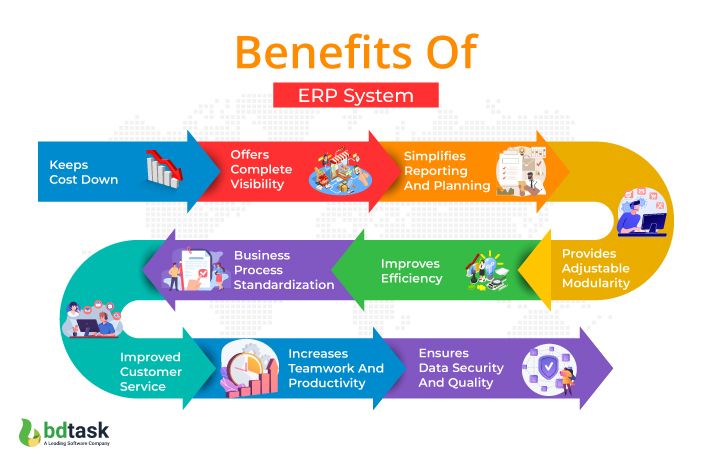Benefits Of ERP Systems For Your Business

The ERP system is a collection of modules and applications used in a business organization to automate different areas of its business processes. The purpose of ERP system is to eliminate the need for routine manual data entry by reducing the amount of information that has to be entered manually. They also increase the accuracy of data entry.
ERP systems have become a significant part of the modern business world. The benefits of ERP systems for your business are many. The benefits of ERP systems include increased productivity, improved employee satisfaction, and decreased costs. ERP systems have also been shown to improve the efficiency of business operations, allowing for better decision-making and increased revenue. This has led to an increase in the number of companies investing in ERP systems.
Through the use of ERP, companies can gain immediate visibility into their operations and also have accurate information at their fingertips. This allows them to make better decisions and improve their productivity.
What Is An ERP System?
ERP stands for Enterprise Resource Planning. Enterprise Resource Planning programs are central to data management in any business organization. It is a computer application system designed to support the effective management of the enterprise. It is used to track and control the business operations of an enterprise. It is a type of integrated information system (IIS) which brings together all the key functions of business management, such as accounting, human resources, purchasing, and sales. It enables business organizations to manage their entire logistics process by linking these functions together.
An ERP system can be customized to meet the specific needs of an organization, or it can be used as-is or integrated with other systems. It streamlines business processes, simplifies daily operations, and improves profitability for businesses of all sizes. It is helpful for any business that needs to manage internal and external processes efficiently.
According to a study, the market for ERP software around the world is expected to be worth $78.4 billion by 2026.
Benefits Of ERP System

ERP systems allow companies to manage and control their entire business, from accounting to manufacturing and distribution. The benefits of ERP systems include improved efficiency, increased profitability, and greater accuracy. It helps companies manage their business processes and increase their productivity. It reduces inefficiencies and makes daily business processes more reliable and efficient. But it has its limitations. Let’s look at some benefits of ERP system below to understand the importance of ERP system for your business.
1. Keeps Cost Down
ERP software costs a lot of money. Many businesses think it's too expensive to buy and don't want to spend that much on a single piece of software. But it's a good investment that keeps the organization's costs down in the long run.
And it's not just one piece of data management software. But it is a group of programs like accounting, human resources, and many others that help the company work better. Any department can enter all of its data at once, share it with other departments in real-time, and keep track of it so that the company can learn from it and keep track of its history. Not only do these facilities automate the company's daily tasks, but they also help employees focus on the most important business tasks.
Spending time on a single system instead of several different pieces of software can also save both time and money as employees can only be trained on one system at a time, not several. According to a recent study, an ERP system can save up to 23 percent cost of your business annually.
2. Offers Complete Visibility
One of the best things about using an ERP system in your business is that it gives you data that you can trust. These benefits are also significant when it comes to marketing. ERP software gives you full access to your organization's most important processes by making information from every sector easy to find.
Also, having all of your company's information in one place makes it easier for people to work together and gets work done faster. This total visibility makes it easier to coordinate workflows and keep track of procedures between departments. This transparency, along with the other benefits of ERP, lets you make quick decisions with confidence because you know you're always seeing the whole picture.
3. Simplifies Reporting And Planning
Along with better visibility, one of the main benefits of ERP system management is better insight. When you use an ERP system in all parts of your company, you create a single system for reporting on all processes.
When an ERP system is used across departments, your business has a single reporting system for all processes. A single source of information can make it easy for an ERP system to give relevant reports and analytics at any time. You don't have to use a lot of spreadsheets and emails to look at and compare how well your company's different departments are working.
Along with their ERP software, many ERP companies also offer business intelligence services. Businesses can get a deeper understanding of how their operations work with the help of BI. These insights help with planning for a company by pointing out operational strengths and problem areas that need to be fixed.
Giving users this complete view of a company's data lets them make better decisions based on trends and metrics. Reporting and planning are essential ERP system benefits because they help users make better decisions.
4. Provides Adjustable Modularity
The most important benefit of advanced ERP is that it is easy to change. Most ERP providers offer a variety of applications that can be used together or separately, depending on the needs of the business. Each app can be used on its own or as part of a bigger set. This lets your business pick and choose the parts that work best for it and leave out the ones that don't.
Setting up the software is another factor. On-premise installations and installations in the cloud are the two main choices. When an on-premise solution is used, the organization must buy and install physical software on all of its PCs and servers. A company called an ERP provider takes care of everything about this system. One ERP innovation that has become more popular in recent years and may continue to do so is cloud software.
To ensure the long-term success of your business, you must keep your eye on the future. Companies often don't prepare well enough, which causes problems to get worse and slows down their progress. Having a system in place that can handle your company's growth smoothly and effectively is essential, and the best ERP software makes it easy.
With the right software provider, it's easy to add more features to an ERP system, whether you're trying to get more clients, go global, add new operations, sectors, or items, or grow your business in some other way. Before you buy an ERP system, you should always make sure that the company selling it knows about your plans for growth in the future.
5. Improves Efficiency
ERP has a lot of good points and bad points on the market. One of the many benefits of ERP system is that it makes daily tasks easier and faster to do. When used correctly, an ERP solution can cut down on or even get rid of tedious manual tasks, making it easier for team members to focus on things that directly affect income. Also, the system might make it easier to accept and use the best practices in the industry by bringing together all company actions.
6. Improved Customer Service
Improved customer service is another significant advantage among the benefits of ERP system. Even if your customers don't know about the ERP system, it helps them. Since client information is centralized and easy to find, your sales team will focus on building relationships with customers instead of keeping track of spreadsheets. Getting and keeping customers should be the most important thing for every business.
7. Ensures Data Security And Quality
One of the most important benefits of ERP system is that it keeps data safe. After all, the ERP system is built around data. Information sharing between different parts of an organization, like customer service, sales, marketing, and business growth, makes the whole team work better.
Limiting who can see and change data is the opposite of letting many people see and change it. ERP systems have set up safeguards to keep your privacy safe. Both on-premise ERP solutions and cloud-based ERP solutions protect your business more. Your ERP system's database lets you back up your important and highly confidential data in one place. Despite what most people think, cloud-based ERP solutions make things even safer.
Many sellers hire security experts who work around the clock to make sure their servers are safe when they store your data in the cloud. Because servers are reliable, it is much harder for hackers to launch exploits on them.
8. Increases Teamwork And Productivity
Teamwork is the best part of the benefits of ERP system. Teamwork is a key part of any organization that does well. But most businesses find that their employees work alone because it takes more time and effort to talk to each other. Teamwork is one of the many important benefits of ERP. With this system, it's easy to work as a team. An ERP system makes it easier for employees to work as a team by giving them access to the information they need, whenever they need it. They make it easy for data to move between sectors and be managed in one place.
This distribution lets people in the organization report on progress and work together better. When your company has an ERP system, every employee has instant access to all of the company's data, which lets them see the big picture. So, your staff will have the skills they need to make better decisions and feel more valued. Overall, the ERP system in your company makes it more efficient, cuts down on costs related to manually recording data, and gets more employees involved.
9. Business Process Standardization
Most ERP engineers build systems that follow the rules of the company. All kinds of organizations can benefit significantly from these tried practices. This lets businesses streamline their programs, making them more productive and efficient. These procedures lead to good results that make your business run better. Also, because many tasks are done by machines, mistakes and costs are greatly reduced. Because of this, there are fewer fights between departments and more working together. Out of all benefits of ERP system, standardization is the best one.
10. Provides A Competitive Advantage
Having this program in your ERP system makes you relevant compared to your rivals. Increased efficiency, automation, real-time access to financial and other KPI data, and the elimination of workflow obstacles will increase your income and improve your standing with customers, investors, coworkers, and partners. You'll be able to make better business judgments since your company will function like a smoothly running gear.
Disadvantages of ERP System in an Organization
A very effective way for a company to be more efficient and save money is to use an ERP system. There are many good things about an ERP system. But to see the other side of an ERP system, let's look at some of its problems. When you know both the pros and cons of getting an ERP system, you will be better able to decide whether or not you want to get one. At the same time, if you buy an ERP system, you can choose the right one for your business.
Cost
An ERP system can make a big difference in your business in a short amount of time. But it can be challenging to buy an ERP system. The ERP system costs quite a bit. So it can be hard for small and medium-sized businesses to buy an ERP system for their business. As the ERP system has a very high up-front cost, it can also be a problem for new businesses.
A cloud-based ERP system, on the other hand, can be used by new businesses that want to improve their efficiency by adding an ERP system. Cloud-based ERP systems can save you money because you don't have to pay anything upfront. Instead, you pay a monthly fee. Small and medium-sized businesses can also use this to cut costs.
But if your business isn't ready to pay for cloud solutions, you can use open-source ERP instead. Open source is not as good as an ERP system that you buy, and it comes with some risks. It works, though. When you think about all the benefits, the price of an ERP system is not too high. But in the long run, it can help your business save a lot of money.
Training
An ERP system lets a company do a lot of different things. It's hard to use because of the same reason. So you need to teach your employees how to use an ERP system. Training can take a lot of time and cost money. At the same time, employees can't do their jobs well if they haven't been trained. So, the idea behind ERP doesn't work if you can't train your employees.
To get the most out of your ERP system, you should train users based on their roles. And a company shouldn't spend money on adding features that aren't necessary for the business. It will make it easier to use the system.
Customization
Another thing that can go wrong with an ERP system is that it can be customized. Some customizations take a lot of time and money, so some businesses don't bother to finish them as per business requirements. Other companies spend a lot of time and money customizing their software and adding features that aren't necessary for their business.
So, businesses should do research and plan to figure out what they need for their business and what they don't need to save time and money. And make sure the system is easy to use and less complicated.
Endnote
Both risks and benefits of ERP exist. ERP systems can help companies be more efficient, get more done, and make more money. ERP systems put all of the information needed for business processes into one database. This database can be used to find inefficient processes, figure out how to best use stock, and fine-tune manufacturing processes. If employees can keep track of and analyze this data, they can get the information they need to make decisions that are more efficient and productive. Also, because all departments share the same information, companies can avoid mistakes and wasted work that cost a lot of money.
At the same time, ERP systems can be expensive, and take a lot of time to learn how to use them properly. There are benefits of ERP systems for businesses but also disadvantages of ERP systems. If you are thinking about buying an ERP system for your business, you should think about both advantages and disadvantages of ERP implementation. So that you are aware of the cons and ready for the risks.










